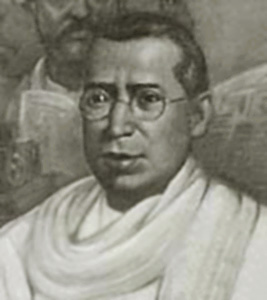 Bipin Chandra Pal was a well-known freedom fighter of India and is considered to be one of the best and original thinkers of the country. According to Sri Aurobindo Ghose, Bipin Chandra Pal was one of the mightiest prophets of Nationalism. He was a man of mission, a great publicist and a magnificent orator. Bipin Chandra Pal was destined to become the chief propagator of the Swadeshi Movement. It was on account of the part played by him in the Swadeshi Movement that Prof. Binoy Kumar Sarkar has described him as `the father of the Bengalee Revolution`.
Bipin Chandra Pal was a well-known freedom fighter of India and is considered to be one of the best and original thinkers of the country. According to Sri Aurobindo Ghose, Bipin Chandra Pal was one of the mightiest prophets of Nationalism. He was a man of mission, a great publicist and a magnificent orator. Bipin Chandra Pal was destined to become the chief propagator of the Swadeshi Movement. It was on account of the part played by him in the Swadeshi Movement that Prof. Binoy Kumar Sarkar has described him as `the father of the Bengalee Revolution`.
Early life
In his youth Bipin Chandra Pal was inspired by his political Guru, Surendra Nath Banerjee. He started taking interest in politics in the early eighties of the last century. He shared the views of the Moderate leaders of the Congress. There was a certain change in him during 1904, due to the official announcement that Bengal was going to be partitioned. There was an anti partition agitation which cropped up against the decision of the government. Bipin Chandra like a true leader flung himself into the movement. He laid stress on the futility of the old methods of agitation through prayers, petitions and protests.
Movements
Bipin Chandra threw himself heart and soul into the Swadeshi movement and towards the end of 1905; he emerged as the greatest leader and architect of the National movement. He drove home the new gospel of liberty through its writings and public oration. Bipin Chandra infused into the boycott movement a dynamic and revolutionary spirit. Although initially the boycott was intended to be an instrument of retaliation of British commerce, Bipin Chandra developed it into an all comprehensive programme of non cooperation with the British government. He declared that the boycott movement was not a mere economic movement but was also a protest against the British rule He advocated the policy of self-help in the political field for securing the natural rights of the Indians.
Bipin Chandra was a great platform orator. He delivered excellent and persuasive speeches both in English and in Bengali. The voice of Bipin Chandra Pal played a decisive role in the partition agitation. When the leaders were divided on the question of national education, Pal supported it and created great enthusiasm among the people to boycott the educational institutions run by the Government. He carried everywhere the gospel of boycott, Swadeshi, national education and Swaraj and worked as the greatest proponent of the new spirit prevailing in the country at that time.
In January 1907, Bipin Chandra went on the most memorable propaganda tour of his career traveling extensively in the various parts of India. Wherever he went, he gave voice to the ideals of the Extremist Party which had already got the upper hand in the Indian politics. He not only defined the Swaraj and devised ways and means to achieve it but also sketched in outline of the would-be constitution of free India of the future. Pal went to England and on his return he became a Moderate like his political Guru Surendra Nath Banerjee. He was no more the visionary and idealist of the past. He even opposed the policy of non-cooperation advocated by Mahatma Gandhi. His popularity began to decline. His old charisma was gone and he died in 1932 in the midst of grinding poverty, almost unwept, unhonoured and unsung.



















